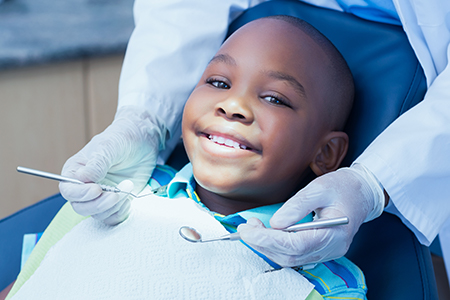
At the office of Complete Dental Care Group, P.L.L.C., caring for children's smiles is more than routine maintenance — it's an investment in lifelong health. Our pediatric dentistry services are designed to guide every stage of dental development, from the first erupting tooth through the transition to adult dentition. We focus on prevention, clear communication with families, and building positive experiences so children grow confident about their oral care.

Healthy smiles begin with habits formed at home. We partner with parents to create practical, age-appropriate routines that fit into busy family life. Our team emphasizes simple daily practices — consistent brushing, supervised flossing when appropriate, and small changes in snacking — that together make a measurable difference in cavity prevention and gum health.
Beyond technique, we teach behavior strategies that turn oral hygiene into an expected part of the day rather than a chore. Rewards, timers, and making brushing playful can dramatically improve cooperation for toddlers and school-age children. We tailor suggestions to each family’s needs so recommendations are realistic and repeatable.
Prevention also includes professional services delivered in a child-friendly way: fluoride varnish, gentle cleanings, and individualized coaching. These steps reduce the chance of future problems and keep visits positive. Our aim is to make every appointment productive and reassuring for both children and their caregivers.

A routine pediatric exam is a comprehensive check of growth, function, and oral health — not just a quick look at cavities. We review medical and dental history, observe how the mouth and jaw are developing, and assess speech patterns, chewing, and breathing when relevant. Our appointments are paced to your child’s comfort level, with clear explanations and opportunities for questions.
Clinical evaluation is paired with preventive care. Professional cleanings remove plaque and surface buildup that brushing at home can miss, while topical fluoride applications provide an extra layer of protection against decay. When necessary, we use targeted radiographs to evaluate areas hidden from the eye so we can detect problems early and recommend minimally invasive options.
Our team also coaches families on practical follow-up: how often your child should be seen, steps to strengthen home care, and signs to watch for between visits. We prioritize clear communication so parents leave with a usable plan rather than a list of medical terms.
Every child’s exam includes a gentle, systematic inspection of the teeth, gums, tongue, and jaw. We check erupting teeth for proper position, screen for early signs of decay, and examine soft tissues for any abnormalities. Bite relationship and jaw alignment are noted so we can recommend early interventions if growth patterns suggest future orthodontic needs.
Dental radiographs are used selectively and responsibly to limit exposure while ensuring that hidden cavities or developmental issues are not missed. Digital imaging gives us detailed information with minimal radiation, allowing for a safer and more accurate assessment of your child’s dental anatomy.
When treatment is necessary, we discuss options and the rationale behind them, focusing on conservative approaches whenever possible. Our goal is to manage small problems early so they don’t become more complex later on.
Tooth decay remains one of the most common health issues affecting children, but it is largely preventable. Decay develops when sugary residues are left on teeth and bacteria produce acids that erode enamel. Reducing frequent sugar exposure, improving brushing habits, and applying protective treatments like fluoride and sealants are effective strategies to lower risk.
We work with families to identify high-risk behaviors—such as prolonged bottle use with milk or juice, frequent snacking on sticky sweets, or inconsistent oral hygiene—and provide step-by-step plans to reduce those risks. Education is central: when families understand the why behind a recommendation, they are more likely to adopt it.
For school-age children, sealants offer targeted protection for the back teeth where grooves trap food and bacteria. Sealants are a simple, painless coating applied to chewing surfaces that can dramatically reduce the chance of cavities in vulnerable molars.
Start dental care early and schedule a first visit by the first birthday or when the first tooth appears.
Keep infant and toddler teeth clean with gentle wiping or an age-appropriate brush to prevent early decay.
Avoid letting babies go to sleep with bottles filled with milk or juice; offer water instead if needed.
Bring children in for regular exams and professional cleanings to catch problems while they are small.
Make brushing and flossing a shared routine — lead by example and supervise until your child can do it well.
Choose tooth-friendly snacks and limit sugary drinks; water is the best everyday beverage for oral health.
Work with your child to wean from pacifiers and thumb sucking at an appropriate age to support healthy development.
Use a properly fitted mouthguard for contact or high-risk sports to protect teeth and soft tissues.

Baby teeth play essential roles beyond making a cute smile: they enable biting and speaking and hold space for the permanent teeth that follow. Because these primary teeth guide the eruption of adult teeth, keeping them healthy supports proper alignment and reduces the need for more complex treatment later.
Professional organizations recommend that a child see a dentist by the first birthday or within six months of the first tooth appearing. Early visits help parents learn how to care for an infant’s mouth, recognize common issues like teething discomfort, and establish a positive relationship between the child and the dental team.
We focus on building familiarity and trust during early visits. Short, gentle exams and parent-focused coaching set the stage for routine checkups. When intervention is needed, we explain options in straightforward language and work with families to select the most appropriate, least invasive path forward.
Active kids sometimes experience dental injuries — a fall on the playground, a bumped tooth, or a sudden toothache. Prompt evaluation reduces the risk of long-term damage. We prioritize same-day or urgent appointments to assess injury severity, stabilize teeth where possible, and prevent infection or developmental complications.
Not all urgent issues are traumatic. Severe pain, swelling, or a persistent fever coupled with dental symptoms can signal infection that needs immediate attention. Our team manages these cases with compassionate urgency, focusing on pain relief, infection control, and preserving tooth structure whenever feasible.
Parents should feel comfortable reaching out when they are unsure whether an issue needs immediate care. Early assessment often means simpler, more successful treatment and a faster return to normal activity for the child.
As children grow, their mouths change rapidly. We monitor facial growth, jaw development, and tooth alignment so potential orthodontic concerns can be identified early. Early detection allows for timely referrals or interventions that may reduce the need for extensive treatment in the future.
Nutrition and overall health are tightly linked to oral development. A balanced diet supports strong enamel and healthy gums, while frequent snacking on sugary foods increases decay risk. We offer practical dietary guidance that supports both dental health and general well-being during these formative years.
Sustained oral health through adolescence builds a foundation for adult care. Our team helps teenagers transition to independent hygiene habits, educates them about the effects of tobacco and vaping on oral tissues, and advises on wisdom tooth development and timing for any extractions if needed.
Monitoring jaw and tooth development is an essential part of pediatric dental care. Early screenings help identify bite problems and habits that can affect growth. If orthodontic treatment is indicated, we provide guidance on timing and coordinate care with specialists to ensure the best long-term outcome.
A child’s diet affects both energy and enamel strength. Foods rich in calcium and phosphorus support tooth mineralization, while crunchy fruits and vegetables promote saliva flow that naturally helps protect teeth. Practical swaps — water instead of sugary beverages, whole fruits instead of sticky candies — can make a big difference.
At Complete Dental Care Group, P.L.L.C., our pediatric dentistry approach is built on prevention, education, and individualized care. We strive to make dental visits calm and constructive so children leave empowered to care for their smiles. Contact us to learn more about our pediatric services or to discuss the best plan for your child’s oral health.
A pedodontist is a dentist who has received advanced specialty training in meeting the dental needs of children from infancy to adolescence. Pedodontists, also referred to as "pediatric dentists," study child psychology, behavior management, caring for children with special needs, methods of handling oral/facial trauma, and various techniques for providing anesthesia and sedation. Pedodontists also understand the complexities of facial growth and development and have the clinical skills required to meet the dental needs of all children at every stage of development. Most of all, pedodontists are passionate about what they do and enjoy working with children. They strive to make every dental experience a positive one as they help children establish a strong foundation for good oral health.
Even before your child is born, their first set of teeth is already forming. In fact, by one year of age, some of your baby's front teeth will have already come into place. While the arrival of your baby's first teeth is only one of many developmental milestones, it represents an excellent time to begin a program of oral care. According to recommendations from the American Dental Association, babies should see the dentist around the time of their first birthdays.
Your baby's first teeth typically begin to appear in the 6 to 12-month range. While this is an extraordinary milestone, you need to be aware that your baby may find the experience a little bit uncomfortable. Teething can make babies feel irritable. They may be fussy, have trouble sleeping, not want to eat, and drool quite a bit.
Although you are powerless to speed up the process of teething, there are a few things that you can do to soothe your baby as the new teeth are erupting into place. Common approaches to helping your baby feel more comfortable while getting new teeth, include teething rings or a cold spoon or moist gauze rubbed over their gums.
Even for these few new teeth, it's absolutely essential to establish an effective regimen of oral care. For information on when your baby's first set of teeth will erupt into place, consult this timeline from the American Dental Association: Eruption Charts
Some children persist in sucking their thumbs or fingers beyond their preschool years. For these children, the activity continues to be a source of comfort, relaxation, and security. It may even help them fall asleep at night. However, it's essential to be aware that in the long-term, a finger sucking habit is not healthy.
If your child's thumb or finger sucking habit is still present when the permanent teeth begin to come in, your child is at a higher risk of developing a bad bite. By the age of five or six years, you need to constructively and gently help your child stop the habit.
It's also a good idea to have a comprehensive evaluation at this time. Your pedodontist can assess if there are any habit related alterations to the alignment of your child's teeth or jaws, or if it is affecting their speech or swallowing patterns. They can also discuss habit control strategies with you, as well as follow your child's bite and facial development as they grow. If interceptive appliances or corrective orthodontic care are recommended, the timetable and best options in care will be explained in complete detail.
